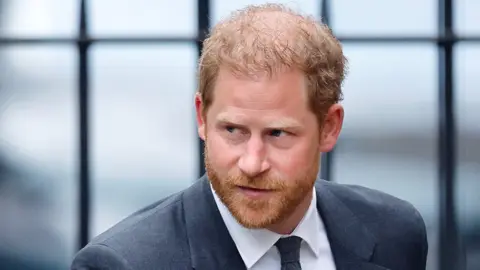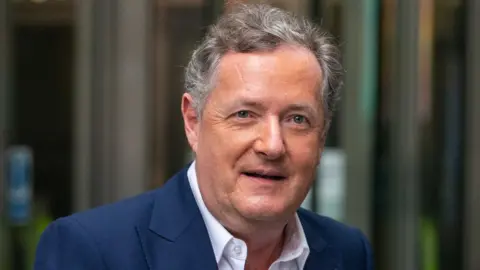Mirror hacking victims demand criminal investigation
 Getty Images
Getty ImagesPhone hacking victims, including Prince Harry, could launch a legal challenge if police do not reopen a criminal investigation into Mirror newspapers.
Their legal team have told the BBC they could attempt a private prosecution themselves, if necessary.
The High Court last week found evidence of "widespread and habitual" use of phone hacking at the Mirror newspapers.
The Met Police said it would consider the judgement but there was no current investigation.
Dr Evan Harris, an adviser to the group of lawyers representing Prince Harry and more than 80 other claimants, said they had faith that the Met Police and Crown Prosecution Service (CPS) would "finally carry out their duties properly, thoroughly, and transparently".
Claimants include Prince Harry's ex-girlfriend Chelsy Davy, actors Kate Winslet and Ricky Tomlinson, footballer Ian Wright and singers Cheryl Tweedy and Sarah Harding, who died while making her claim.
Prosecutors closed down a previous inquiry in 2015 but lawyers plan to help the police identify potential new evidence and witnesses from the Mirror phone hacking trial.
However, if police and prosecutors decided not to act, Dr Harris said, the claimants would challenge those decisions.
The Victim's Right to Review scheme allows victims of crime to request that the CPS reconsider a decision not to prosecute.
"In fact a judicial review and/or a private prosecution would also be real possibilities," Dr Harris said.
These are serious offences compounded by even more serious offences," he claimed, adding that these included perjury and "other criminal forms of coverup".
A judicial review would involve the High Court deciding if a police decision not to prosecute was unlawful.
In a private prosecution, hacking victims would ask a magistrate to begin a case against MGN, bypassing the CPS.
The Metropolitan Police began investigating phone hacking at Mirror titles, primarily the Sunday Mirror, in 2013.
A series of journalists were arrested and the former Daily Mirror Editor Piers Morgan was questioned under caution.
But in December 2015, the CPS decided there was insufficient evidence to prosecute 10 journalists connected to the Mirror titles.
For the Metropolitan Police this closed the book on a difficult and politically sensitive series of inquiries, and Scotland Yard may need persuading to reopen it.
The lawyers involved in this summer's unprecedented court hearings - during which Prince Harry became the first royal in modern times to give evidence in the witness box - say the police now have access to significant new evidence against MGN.
Any criminal investigation would consider whether Mirror Group journalists or private investigators working for them had unlawfully accessed telephone voicemail messages.
This would be a breach of the Regulation of Investigatory Powers Act.
The former editor of the News of the World, Andy Coulson, was convicted of this offence, along with other journalists, in 2014 and sentenced to 18 months in prison.
The News of the World was owned by a different company, now called News UK. It was shut down in 2011.
A police investigation could also look at the use of private investigators to obtain information about prominent people for use in newspaper stories.
They could face charges under data protection laws, or legislation restricting the use of the electoral roll.
The judge in the Mirror hacking case, Mr Justice Fancourt, named 11 private investigator firms involved in "extensive" or "habitual" unlawful information gathering or phone hacking on behalf of the Daily Mirror, Sunday Mirror and People newspapers.
"They were an integral part of the system that existed at all three newspapers to collect private information unlawfully and then publish it," he ruled.
 PA Media
PA MediaAny journalists or executives shown to have lied to the Leveson Inquiry into press standards in 2011 and 2012 could face charges of perjury.
A key question for the police and prosecutors would be whether the activities of journalists and investigators were "unlawful" - likely to result in a civil court finding against them - or "illegal" - a breach of the criminal law.
Judge Fancourt decided "on the balance of probabilities" that unlawful information gathering had taken place. In other words, that it was more likely than not.
His judgement went further in places, concluding that there was "no doubt" that the editors of the newspapers knew about phone hacking and unlawful information gathering and "were in a position" to tell senior executives about it, but didn't.
For a jury to find someone guilty in a criminal trial they would have to be "sure, beyond all reasonable doubt".
Some of those accused in this case, including Piers Morgan, gave no evidence at all in their defence and didn't appear in court.
A criminal trial would require all of the accused to be in the dock, defended by senior barristers. They would be able to decide whether to give evidence personally in front of a jury.
Following Friday's judgement, Mr Morgan again denied personally hacking a phone or ordering someone to and said "nobody has produced any actual evidence to prove that I did".
MGN said it welcomed the judgement which gave the business "clarity to move forward from events that took place many years ago".
"Where historical wrongdoing took place, we apologise unreservedly, have taken full responsibility and paid appropriate compensation," the company which now owns MGN, Reach PLC, said in a statement.
